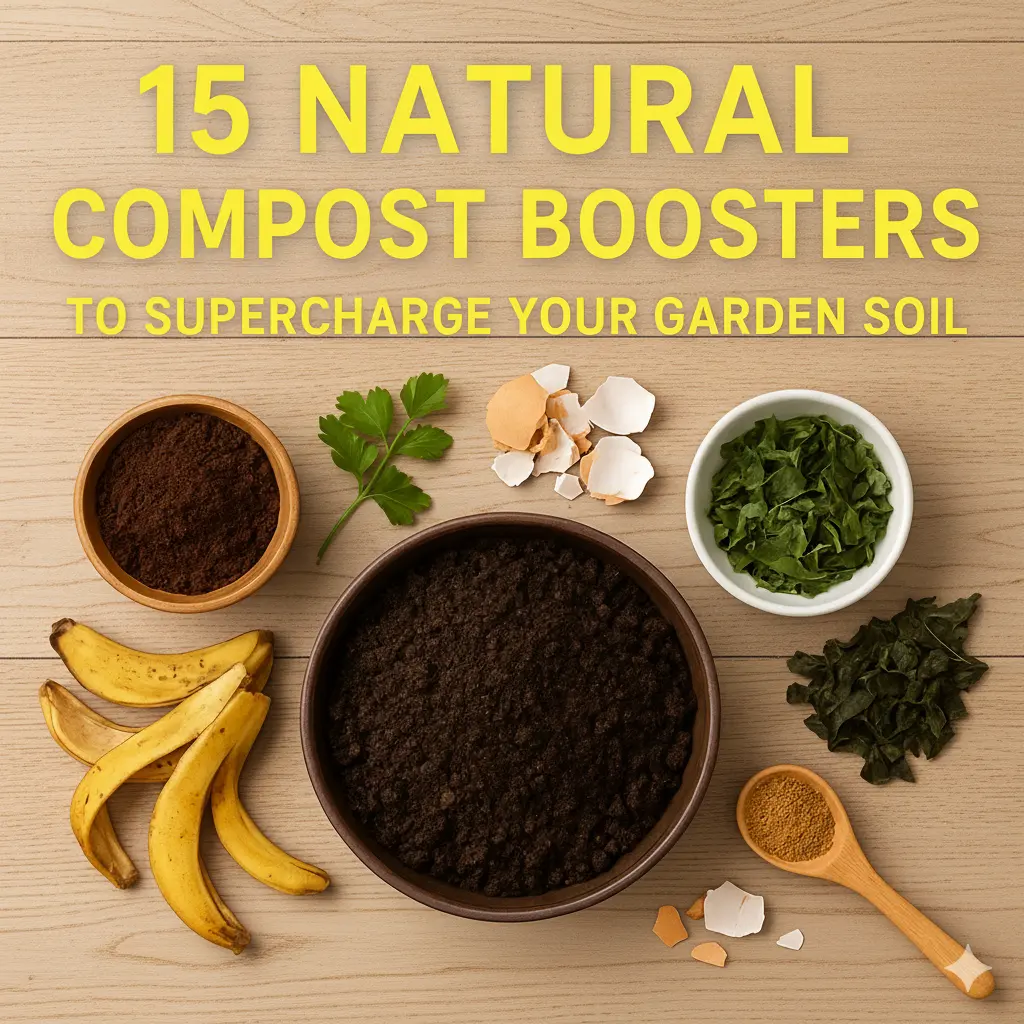Composting is one of the easiest ways to turn kitchen scraps and garden waste into nutrient-rich soil that helps your plants thrive. But did you know that certain natural ingredients can supercharge your compost, making it break down faster and become even more beneficial for your garden? From coffee grounds to alfalfa pellets, these simple boosters give your soil the extra nutrients it needs for strong, healthy plants.
1. Coffee Grounds
Used coffee grounds are a fantastic way to give your compost a nitrogen boost. They help microbes break down organic material faster, resulting in richer soil. I like to sprinkle my morning coffee leftovers directly onto the compost pile instead of tossing them in the trash—it feels good to know my caffeine habit is helping my garden grow.
2. Eggshells
Crushed eggshells add calcium to your compost, which helps strengthen plant cell walls and prevents blossom-end rot in vegetables like tomatoes. I usually keep a little container on the counter for shells, dry them in the oven for a few minutes, then crush them before adding to the compost. It’s a simple habit that makes a big difference.
3. Banana Peels
Banana peels are packed with potassium and phosphorus, essential nutrients for healthy plant growth. I chop them into small pieces before tossing them into the compost to help them break down faster. Plus, my kids love watching the peels disappear in the pile—it’s like a mini science experiment.
4. Grass Clippings
Fresh grass clippings are full of nitrogen, which helps heat up your compost pile and speed up decomposition. Just be careful not to add too many at once or they can turn slimy. I usually mix them with dry leaves or shredded paper to keep the balance right.
5. Vegetable Scraps
Kitchen veggie scraps like carrot tops, onion skins, and leftover greens are excellent compost boosters. They add moisture and a variety of nutrients to the pile. I keep a small compost bin in my kitchen and it’s amazing how quickly it fills up—it turns cooking leftovers into “black gold” for my garden.
6. Seaweed
If you live near the coast or can get dried seaweed from a garden supplier, it’s a goldmine for your compost. Seaweed is full of trace minerals and natural growth hormones that help plants thrive. I like to rinse it first to remove excess salt, then chop it up before adding it to the pile—it smells a bit fishy at first, but the results are worth it.
7. Manure
Well-aged animal manure, like from cows, horses, or chickens, is a classic compost booster. It’s rich in nitrogen and other nutrients that supercharge your soil. I always make sure it’s properly composted before using it in my garden to avoid burning plants. There’s nothing like seeing your vegetables flourish after a little help from nature’s fertilizer.
8. Wood Ash
Wood ash from your fireplace or wood stove adds potassium and raises soil pH, which is great if your compost is too acidic. Sprinkle it lightly over your compost and mix it in well. I like using ash from my winter fires—it’s a great way to recycle and nourish my garden at the same time.
9. Tea Leaves
Used tea leaves are another simple booster packed with nitrogen and organic matter. You can add them straight from your cup into the compost. I often dry them slightly first, then toss them in—it’s a tiny step that keeps my compost pile lively and thriving.
10. Shredded Paper and Cardboard
While not nutrient-rich on their own, shredded paper and cardboard provide carbon, which balances nitrogen-rich materials in your compost. I like to save old boxes and newspapers, tear them up, and layer them with kitchen scraps. It keeps the pile from getting too wet or smelly, and it’s an easy way to reuse waste that would otherwise end up in the trash.
11. Molasses
A spoonful of molasses can give your compost a quick energy boost for the microbes that break down organic matter. Just mix a little into a watering can with water and sprinkle it over your compost pile. I’ve noticed that my pile heats up faster and smells fresher when I add this sweet little helper.
12. Nut Shells
Crushed nutshells from almonds, walnuts, or peanuts add slow-releasing nutrients and improve compost structure. They take longer to decompose, which helps aerate the pile over time. I keep a small bag of crushed shells from my baking experiments to sprinkle into the compost—it’s like giving it a long-lasting energy bar.
13. Fruit Peels
Citrus peels, apple cores, and other fruit scraps are full of vitamins and sugars that feed compost microbes. I chop them into small pieces to speed up decomposition. My favorite trick is saving orange peels from winter snacks—they help my garden soil feel vibrant and alive.
14. Hair and Fur
Human hair or pet fur might seem odd, but it’s full of nitrogen and breaks down slowly, enriching your compost over time. I gather hair from hairbrushes and pet grooming and add it in layers. It’s a little weird at first, but knowing it’s helping my tomatoes grow bigger makes it worth it.
15. Alfalfa Pellets
Alfalfa pellets, often used as livestock feed, are an excellent compost booster. They provide nitrogen, trace minerals, and even growth hormones that help plants flourish. I sprinkle a handful directly into my compost pile every few weeks—it’s a quick and easy way to give my soil a natural “power-up.”
11. Molasses
A spoonful of molasses can give your compost a quick energy boost for the microbes that break down organic matter. Just mix a little into a watering can with water and sprinkle it over your compost pile. I’ve noticed that my pile heats up faster and smells fresher when I add this sweet little helper.
12. Nut Shells
Crushed nutshells from almonds, walnuts, or peanuts add slow-releasing nutrients and improve compost structure. They take longer to decompose, which helps aerate the pile over time. I keep a small bag of crushed shells from my baking experiments to sprinkle into the compost—it’s like giving it a long-lasting energy bar.
13. Fruit Peels
Citrus peels, apple cores, and other fruit scraps are full of vitamins and sugars that feed compost microbes. I chop them into small pieces to speed up decomposition. My favorite trick is saving orange peels from winter snacks—they help my garden soil feel vibrant and alive.
14. Hair and Fur
Human hair or pet fur might seem odd, but it’s full of nitrogen and breaks down slowly, enriching your compost over time. I gather hair from hairbrushes and pet grooming and add it in layers. It’s a little weird at first, but knowing it’s helping my tomatoes grow bigger makes it worth it.
15. Alfalfa Pellets
Alfalfa pellets, often used as livestock feed, are an excellent compost booster. They provide nitrogen, trace minerals, and even growth hormones that help plants flourish. I sprinkle a handful directly into my compost pile every few weeks—it’s a quick and easy way to give my soil a natural “power-up.”
By adding these natural compost boosters to your pile, you’re not just recycling waste—you’re creating a powerhouse of nutrients that feeds your garden from the ground up. With a few simple additions and a little care, your compost will transform into rich, fertile soil that helps your plants flourish season after season.


